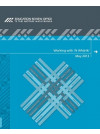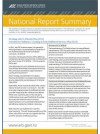This national report is one of two reports that present the findings of a 2012 national evaluation about curriculum priorities.
A summary of both reports is available below – it provides a snapshot of what we found as well as some self-review questions and indicators for early childhood services.
Methodology
The data for this evaluation report was drawn from information gathered about “curriculum priorities and emphases in early childhood services” in Terms 1, 2 and 3, 2012. Information was gathered from 627 services. ERO asked specifically about:
- the links between early childhood services’ curriculum priorities and emphases, their curriculum and the principles and strands of Te Whāriki
- the other influences on each service’s curriculum.
See the companion ERO report Priorities for Children's Learning in Early Childhood Services (May 2013) for further information about the broader evaluation framework.
Data collection
During each service’s review, ERO collected information from a variety of sources including:
- discussions with managers and teachers at the service
- informal discussions with parents and whānau
- documentation related to the operation of the service and the learning of children.
All data was collected by ERO review officers in the normal course of their review activities.
The term teacher as used in this report refers to teacher, educator, and kaiako


